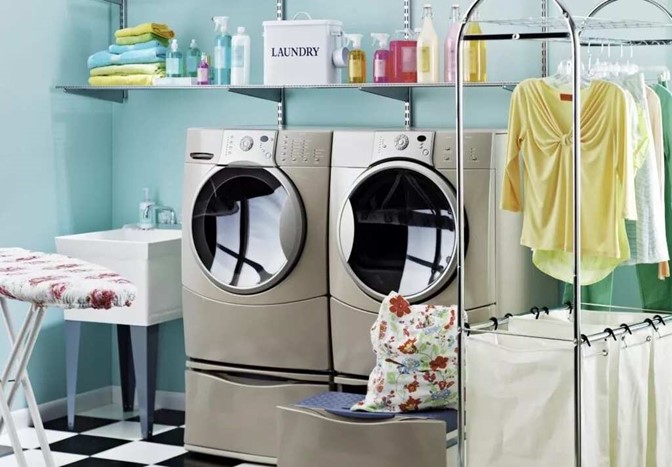Introduction
The laundry industry in Nigeria is currently witnessing a remarkable surge, propelled by the frenetic pace of modern life and the evolving dynamics within households across the nation.
With the steady ascent of disposable incomes and the ever-increasing demands on individuals’ time, the need for efficient laundry services has become more pronounced than ever before. Against this backdrop, establishing a laundry business presents not only an opportunity to meet a fundamental need but also offers entrepreneurs a relatively accessible entry point into the realm of entrepreneurship.
Consequently, the laundry business emerges as a beacon of convenience and practicality in a landscape characterized by bustling urban centers and hectic schedules. In this context, venturing into the laundry business represents not just a commercial endeavor but also a chance to provide a valuable service that streamlines daily routines and enhances the quality of life for individuals and families alike.
Follow these eight key steps to establish a successful laundry company that delivers consistent profits.
1. Conduct Market Research

To initiate a laundry enterprise in Nigeria, conduct a market research. Before diving into startup logistics, perform in-depth market research to determine if a laundry business is viable in your area. Gather information on potential customer demographics and their laundry needs. Drive around town and take note of laundry competition while identifying ideal locations for your shop. Talk to existing laundry owners to gain insider knowledge of operations, expenses, profit margins, and growth opportunities.
Thorough market research gives critical data for constructing your business plan. It also uncovers gaps in existing laundry services that present prime opportunities to meet unfulfilled consumer demand. Use market research findings to shape your competitive advantages in pricing, service offerings, customer convenience, or eco-friendly practices.
2. Create a Business Plan
To launch a laundry venture in Nigeria, create a business plan. Now use your market research learnings to craft a formal business plan. This living document maps out every aspect of your envisioned laundry company.
Start by clearly defining your business. Detail the services you will provide, your competitive advantages, target customers, and how you will position yourself against competitors.
Next, provide an overview of daily operations. How many staff will you hire initially? What types of commercial washers and dryers will you utilize? Do you plan on offering pickup/dropoff services? Will you provide washing powder or require customers to bring their own?
Outline your step-by-step startup tasks, from registering your business name to installing equipment. Then project expenses for rent, renovations, salaries, taxes, utilities, machinery, products, and marketing. This provides cost benchmarks when securing funding later.
No business plan is complete without financial projections. Use your expense estimates to calculate expected profits month-over-month for the first year. Also project annual income and growth over three to five years. Your profit projections will demonstrate the viability and earning potential of your laundry concept.
3. Choose a Business Structure
To establish a laundry company in Nigeria, choose your business structure. Nigerian businesses operate under four primary structures:
- Sole Proprietorship: Owned by one person who has unlimited liability. No formal business registration needed.
- Partnership: Formed by two or more co-owners with shared profits and unlimited liability. A written partnership agreement governs the responsibilities and terms for each partner.
- Limited Liability Company (LLC): Provides owners protection from business debts and obligations. Owners’ assets cannot be seized to settle company debts. An LLC registration certificate must be attained.
- Private Limited Company: Considered separate legal entities from their owners. Owners’ assets are protected from seizures to cover company debts. More complex registration procedure through Corporate Affairs Commission.
Most small laundry startups register as sole proprietors or LLCs. Partnerships work for two co-founders pooling startup resources. Wealthy founders wanting full asset protection may form private limited companies.
Consult professionals to select your optimal structure considering fee costs, tax implications, and personal liability.
4. Register Your Business
To inaugurate a laundry company in Nigeria, ensure you register your business. Once you determine your structure, officially register your laundry business. Appoint a creative director to oversee branding and trademarks. Register unique names to establish your brand identity under trademark laws. Prevent branding confusion with competitors by avoiding generic names.
You can apply for business permits and licenses through the State Ministry of Commerce and Industry. LLCs and other partnerships must register for LLC certificates or partnership agreements with the Corporate Affairs Commission (CAC).
Beyond government paperwork, open business bank accounts and secure a TIN number for tax purposes. Set up bookkeeping systems for transparent financial reporting. Adhere to all legal, tax and labor regulations to operate fully above board. Scarce compliance resources mean extra vigilance with documentation provides protection from penalties down the road.
5. Find a Location
To embark on a laundry business in Nigeria, identifying the optimal location lays the foundation for your laundry’s success. Seek real estate in densely populated areas frequented by your target market. Sites near residential quarters, university campuses, hospitals or military barracks provide natural customer traffic. High foot traffic shopping plazas also offer prime visibility, especially if surrounded by restaurants, food and retail stores.
In small Nigerian cities, converting an empty shop into your laundry works well for minimizing rental overhead. Larger urban locations have higher rents, so renovating unused backrooms into serve-yourself launderettes keeps costs low. Upscale areas catering to wealthy clientele support higher price points for premium services.
Consider proximity to major transit hubs. Laundries closer to bus stations generate regular patrons traveling to outlying neighborhoods. Locate your shop within walking distances from parking areas since few patrons use cars for small laundry errands.
Plot accessibility for customers and suppliers delivering inventory must also factor into your location decision. Inaccessible muddy roads or reliably clogged intersections quickly dissuade patrons from returning. Know the surrounding infrastructure.
6. Design Your Laundry
To set up a laundry service in Nigeria, design an efficient laundry workflow catering to your space constraints and target demographics. Separate washing/drying areas from packing/ironing sections using partitions. Categorize work desks for easy sorting and organization of clean versus soiled linens. Customize seating choices based on customer volumes and average visit durations.
Invest in ergonomic washers, dryers and steam irons that require minimal physical exertion to operate, reducing staff fatigue. Install stacked equipment units allowing for condensed floor plans. Determine ideal machine capacities – smaller for domestic households or oversized for hotel/hospital bulky items.
Think through ventilation, water access and drainage during build-outs. Proper lighting keeps staff alert and boosts security. Allocate staff lockers plus customer amenities like drinking water, waiting areas, Wi-Fi, ATMs etc.
Splash vibrant colors or trendy interior design for upscale laundries targeting youths and urban professionals. Leverage spacious parking and 24/7 access to attract hostel and residential estate patrons.
7. Purchase Commercial Equipment
To start a laundry business, invest in robust washers, dryers and steamers engineered for intensive commercial use. Favor energy-efficient models providing quicker turnarounds for increased customer volumes. Buy multiple medium-capacity units enabling customized fabric, water temperature and cycle settings. Large units also work for bulk institutional items like hotel linens.
Beyond heavy machinery, stock your laundry with must-have accessories – Laundry baskets, bags, drying racks, ironing boards, steam irons, weighing scales, racks, storage shelves, hangers, sewing kits, stain removers, packaging supplies, office supplies, backup generator, and first-aid kit.
8. Staff Up & Train Employees
To expand your laundry business in Nigeria, hire staff and train them. With equipment set up complete, hire your first employees – laundry assistants, counter attendants, ironing specialists etc. Screen applicants thoroughly checking references to minimize workplace misconduct. Provide formal new hire training on safety protocols when operating heavy machinery, handling chemicals plus service etiquette when engaging customers. Define codes of conduct emphasizing integrity during financial transactions.
Install surveillance cameras with clearly displayed signage to deter crime while protecting owners from false accusations. Conduct surprise cash audits and inventory checks even among trusted long-term staff to disincentivize fraud.
Now launch targeted advertising campaigns announcing your laundry’s grand opening!
Recap
This guide delves into the burgeoning laundry industry in Nigeria, propelled by evolving household dynamics and increasing demand for convenience. It presents a detailed, step-by-step approach to launching a successful laundry business in the country.
From conducting thorough market research to crafting a comprehensive business plan, navigating legal requirements, finding prime locations, designing efficient facilities, procuring commercial-grade equipment, staffing, and implementing effective marketing strategies, every aspect is covered.
By following these meticulously outlined steps, aspiring entrepreneurs can navigate the complexities of the laundry business landscape in Nigeria, capitalize on emerging opportunities, and establish thriving ventures that cater to the evolving needs of modern consumers while ensuring long-term profitability and sustainability.


















